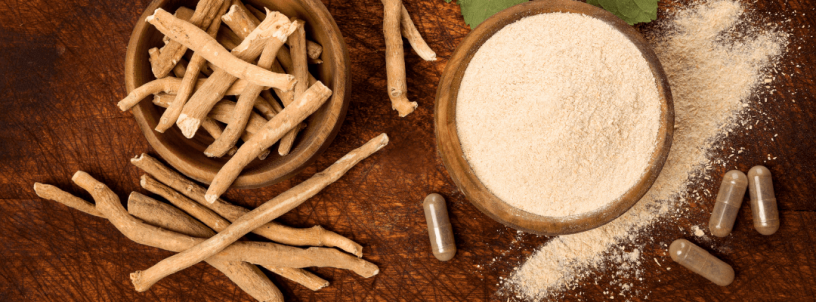Life is stressful, and many people are turning to self-care to cope. One popular natural remedy for stress is ashwagandha, an ancient adaptogenic herb.
Read on to learn more about the health benefits of ashwagandha and how it can help you reduce stress!
What is Ashwagandha?
Ashwagandha (Withania somnifera), also known as “Winter Cherry” or “Indian Ginseng,” is one of the most important herbs in Ayurveda, the traditional Indian system of medicine. Ayurveda is based on the principles of natural healing and aims to restore balance and harmony to the body, mind, and spirit.
Ashwagandha is a small shrub with yellow flowers that is native to Southeast Asia and India. The plant’s power comes from the extracts of its roots and leaves.
Ashwagandha, a popular herbal supplement, is now widely available on its own or combined with other beneficial herbs. Its popularity has grown steadily over the years, and for good reason. Let’s take a look …
Benefits of Ashwagandha
Ashwagandha, a natural mood enhancer and stress reliever used for thousands of years, offers a wide range of other health benefits.
Stress and Mood Support
Ashwagandha, a centuries-old natural mood booster, is best known for its ability to reduce stress.
Ashwagandha reduces stress by controlling stress mediators and reducing the activity of the hypothalamic-pituitary-adrenal (HPA) axis, the body’s stress response system.
Improve Sleep and Clarity
Ashwagandha can help improve sleep quality, leading to clearer, more rejuvenated minds in the morning.
Evidence also suggests that Ashwagandha may be a natural remedy for insomnia.
Boost Energy and Recovery
Ashwagandha is a promising supplement for athletes, as it can enhance physical performance and increase muscle strength.
Ashwagandha may improve muscle strength and oxygen levels during exercise, leading to enhanced physical performance.
Improve Brain Function and Memory
Ashwagandha may improve cognitive function, especially in older adults with mild cognitive impairment and possibly people with schizophrenia. Its antioxidant properties may help protect the brain and promote cognitive health.
Ashwagandha may help with:
- Attention
- Reaction time
- Performance on cognitive tasks
- Executive functioning
- Information-processing speed
- Immediate and general memory
Additional Benefits
Although more research is needed on some other benefits, ashwagandha may also help with:
- Reducing blood sugar levels
- Reducing inflammation
- Boosting testosterone and fertility in men
When Should I Take Ashwagandha?
Ashwagandha is generally safe to take at any time of day, but some people prefer to take it with a meal or snack to reduce the risk of stomach upset.
If you’re taking ashwagandha for sleep, you may want to take it about an hour before bed. Otherwise, you can take it at any time of day that works best for you.
The most important thing is to be consistent with your dosage and take ashwagandha at the same time each day.
What to Look for in Ashwagandha Supplements
With so many ashwagandha supplements on the market, it can be tough to know where to start. Here are a few things to look for when choosing an ashwagandha supplement:
- Organic KSM-66® with 5% Withanolides
- Black Pepper for Enhanced Absorption
- Pure, Simple Ingredients
- Reputable Brand
Find the perfect ashwagandha supplement with the above attributes!
In Summary
For the best ashwagandha supplement, you’ll want a potent, proprietary blend of organic ashwagandha root extract and organic black pepper that can help you tackle everyday stress and get to feeling at peace.

